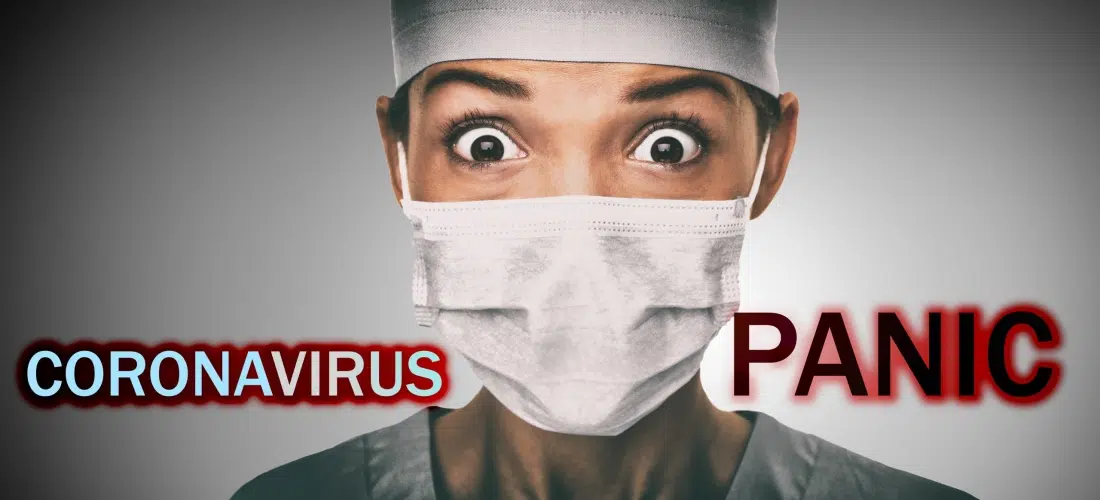These last few weeks, any screen you turn on from social media to the news, there’s someone talking about Coronavirus. The coronavirus situation is constantly changing, often several times per day, so it’s no surprise that anxiety levels stay elevated.
Do you find yourself glued to the TV or social media? Are you worried about the health and safety of yourself and loved ones, as well as the general public? You’re definitely not alone!
Anxiety is a feeling – an emotion that alerts us to potential danger. In many ways, some anxiety in situations such as a pandemic is expected and helpful, especially when that anxiety motivates people to take the precautions necessary for overall health and wellness. Excessive worry and constant media coverage, though can make anxiety difficult to control.
There are several reasons why overwhelming media coverage and social media conversations send people into a frenzy, hoarding toilet paper, hand sanitizer, stealing face masks, going into doomsday prepper mode:
Uncertainty and Fear of the Unknown
The amount of unknown and the constant flow of information as it constantly comes out tends to create a deep fear of simply not knowing. This fear is multiplied when the health and safety of ourselves and loved ones could be in question. People are afraid of the unknown. The internet is full of questions about “what’s coming next” and “how bad is it going to be?”
Anxiety also sparks a need to gain a sense of control. We want to be able to be in control of our own well being. In this situation, we don’t know exactly what needs to be done or what step to take, which leaves us feeling helpless and scared. While this is a normal response of our brain to an uncertain situation, it’s important to be aware if anxiety starts to spiral out of control.
New and Different
The simple fact that coronavirus is a new illness and completely unfamiliar to us and the rest of the world creates anxiety. The news media is continually keeping us informed by bombarding us with whatever new information they have, but the overall message continues to be “we don’t know.” Add the new unfamiliar nature of the virus and the uncertainty about it’s impact or how to get it under control and you have the perfect recipe for anxiety.
Conflicting Information
Information about the coronavirus, it’s spread, impact and the actions of government leaders is constantly changing, sometimes by the hour. Media reports everything, so it’s easy to become increasingly anxious when we are hearing conflicting information, especially from health officials and government leaders. Furthermore, different media sources, not to mention local social media posts and conversations all report pieces of what is currently known, which can lead to confusion. Confusion is uncertainty, which increases anxiety.
Assessing Risk
Widespread quarantines, like those happening in Italy, as well as the increasing numbers of cancellations and school closures all being reported throughout the day make it difficult for people to tell how much they should be worrying. You may convince yourself that the coronavirus is a mild illness and to continue life as usual, but the constant bombardment of alarming news such as empty grocery store shelves, closed schools and canceled events make it natural to second guess. Often, risks to the larger population translate into personal risk in our minds. It can be hard to separate the two.
So what do we do? How can you manage anxiety and distress in times of uncertainty and constant media coverage? The World Health Organization and Mental Health America offered some advice this week for taking care of your mental health. Here are some tips:
- Limit News
Avoid news and social media that causes you to feel overly anxious. Limit checking the news to specific times of the day (twice per day, for example) ONLY. Get the facts you need, and turn it off. Also, be sure to get facts from trusted sources to avoid being confused by rumors and media hype.
- Protect Yourself, Support Others
Helping others who need your support can have a huge impact on your own well-being.
- Be Comfortable
Do the things you already enjoy doing at home. Take this time to connect with your immediate family and comfort one another by playing and having fun!
- Stress Relief
Practice techniques for relieving stress if you feel your anxiety spiraling out of control. Try some deep breathing and/or meditation. Read a book. Exercise. Take a walk. Play with your dog. Work a puzzle. Play a game.
- Make Healthy Choices
Don’t stress eat or drink alcohol excessively. In the long run, this will only make anxiety worse.
- Focus on the Future
Make some plans for six months from now or sometime in the future. Help get your mind off the constantly changing state of things right now.
The coronavirus pandemic will run its course. Schools and businesses will not be shut down forever. Above all, remember to take care of yourself and take measures to alleviate stress and anxiety.
If you are having trouble regaining control of your anxiety, or you are struggling in your day to day functioning due to excessive and unproductive anxiety, seek the help of a therapist who specializes in treating anxiety disorders.
Redeemed Life Counseling is here to help! Call or email us today to set up an appointment with a therapist who can help you.
940-222-8552 or email [email protected]
Michelle Fitzhugh, MA, LPC, EMDR
Clinical Director, Redeemed Life Counseling, LLC
Teen Social Anxiety

